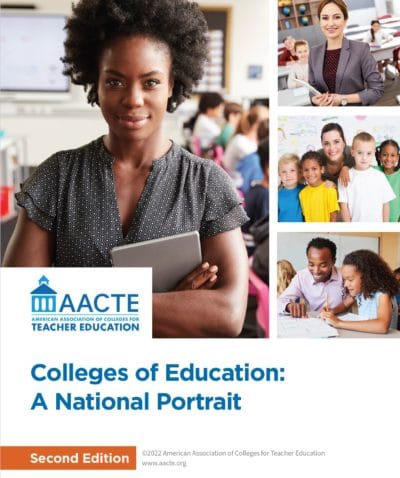Colleges of Education: A National Portrait, Second Edition

Colleges of Education: A National Portrait, Second Edition (2022) provides an update of AACTE’s signature report first published in 2018, describing the key trends and challenges in meeting the nation’s need for highly skilled educators. The report offers a comprehensive picture of the nation’s schools, colleges, and departments of education: the work that they do, the people who do that work, and the students they serve. This edition features a special analysis on the contributions that community colleges make to educator preparation.
Colleges and universities can benchmark their programs against peers, gain innovative ideas to grow and diversify enrollment through community college partnerships, and describe to stakeholders the challenges confronting educator preparation.
The report, an exclusive AACTE member benefit, includes national data through 2018–19, the last complete academic year prior to the coronavirus pandemic. Using data from an array of governmental and organizational sources, the report highlights several key trends and concerns:
- Community colleges make important contributions by preparing a diverse student body to pursue careers in the education profession.
- The number of undergraduate education degrees awarded annually was stable until the early 2010s. In 2018–19, fewer than 90,000 bachelor’s degrees were conferred in education.
- Over the last decade, there has been a significant decline in the number of degrees and certificates conferred in high-need specialties, including a 4% decrease in special education, 27% decrease in science and mathematics education, and 44% decrease in foreign language education.
- There is strong evidence that all students of color and white students alike benefit academically from teachers with diverse backgrounds, but there is a mismatch between teachers and PK-12 students served. In 2022, 55% of students in public schools are non-white, presenting an opportunity to engage in early recruitment efforts of diverse candidates.
- Despite concerted efforts to recruit diverse students to pursue teaching as a career path, comparatively few candidates of color are completing traditional teacher preparation programs, with 71% of completers identified as white.
- Colleges of education also lack diversity in their faculty and leadership. Deans, associate/assistant deans, and tenure-track faculty are overwhelmingly white.
Many of the challenges affecting colleges of education identified in the first edition of the National Portrait remain and have been heightened due to the coronavirus pandemic. Despite these challenges, colleges of education remain resilient and play a critical role in the nation’s education system.
Authors Jacqueline E. King, Ph.D., an independent consultant who works with PK-12 and higher education leaders to improve student outcomes, and Weadé James, Ph.D., senior director, development and research at AACTE, will present findings in a webinar on Monday, March 28.
This report is available to AACTE members only.
